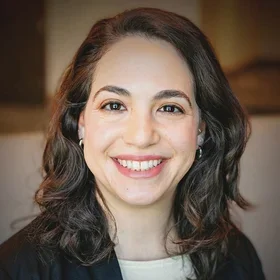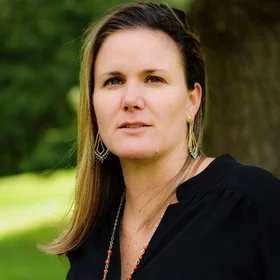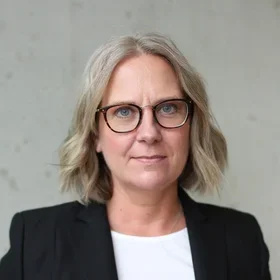Myrlene Laroche, '20SPS, IKNS, was inspired by Ben Royce’s forward-thinking, data-driven work. Laroche learned that Royce had earned an M.S. in Information and Knowledge Strategy from the Columbia University School of Professional Studies, and so she followed suit. A Spring 2020 graduate, she has already earned a spot at the global advertising agency TBWA\WorldHealth as VP, Director of Strategy. Laroche shares how she applied the curriculum in shaping the direction of her career and why she thinks businesses with robust knowledge management infrastructure will have a long-term competitive advantage.
What were you doing before you enrolled in the Information and Knowledge Strategy (IKNS) M.S. program?
I worked in a range of marketing roles related to eCommerce, social media, content and customer relationship management (CRM). Then I became a Data Strategy Lead at Publicis New York, where I focused on data and how it interacts with marketing. Two years ago, I began both Columbia’s INKS program and my previous position as Strategic Planning Director at a global healthcare advertising agency. As if that was not enough, I also became an Advertising Club of New York I’mPart Fellow. At the time, my goal was to pivot in my career and understand a facet of business that I hadn’t worked in before.
How does data intersect with communications and marketing in particular?
The person that hired me at Publicis is a Columbia IKNS grad and now lecturer, Ben Royce,’14SPS. Initially I thought I was hired into an SEO role, but on my first day, Ben said, “Of course, we’re going to be working on SEO, but I’ve also created a new way of using data to inform insights for strategy and we want to be able to use it in all facets of marketing and the business as a whole.”
Having worked in so many areas of marketing and business, the department head wanted me to help him find ways to integrate this throughout the department’s work. In advertising, when you first walk in, you usually get smaller accounts. But I was entrusted with a huge brand. My job was to execute tactics like generating analytics reports and conducting website content audits, but also to examine a new way of using data to inform strategic thinking. A large part of my role involved working with everyone in strategy and everyone in data and then cross-teaching each other’s roles and the knowledge they offered.
There’s a saying by Mikko Hyppönen that ‘People are more honest in their search engines than they are with their families.’ So when you look at consumer behaviors from a macro perspective, you learn things that people may not want to directly self-report. But it’s still information that is important for the brand. It tells the brand that this unsaid truth is a customer need and the direction they need to go in.”
Can you give an example of an account or project that allowed you to demonstrate your ability to interpret data and then strategize?
I had the opportunity to work on a project for a client that specializes in oral care products. They were looking for a new, more competitive brand strategy. I searched and aggregated behavioral data, looking for insights that would bubble up. I realized that customers who were having oral care problems were attributing it to their gum health. So I thought, “What if we presented the client’s product as the solution to their customers’ gum health issues?” My internal strategy team warned that my findings will be met with resistance. They told me that our client's own consumer research suggested that consumers associated their products with actually hurting their gums. My initial reaction was, “based on the data, I don’t think that’s true!” But at that moment, I didn’t know how to prove it yet.
As I continued to work on this assignment, I looped in our data science team. It occurred to us that it would be really valuable to get the customers to share information without us actually asking them. Our hunch was that the “said behavior” of the customers and their actual behavior is different. The team came up with the idea of analyzing Amazon reviews of the products. We ultimately gathered and compared enough data to show that customers were, in fact, seeing positive changes in their gum health because of the client’s products. My team presented the data, asking our client to reconsider their position on linking their products to gum health. The client accepted the new direction and the concept was eventually adopted into the brand’s global strategy. At the time, it was beyond my professional scope to pitch to the clients, so I was initially unaware that I helped to redirect the strategy of a multibillion-dollar brand!
Were you familiar with information and knowledge strategy before enrolling in the program at Columbia?
I had no idea what information and knowledge strategy was. I was originally working toward getting an M.B.A. But when I met Ben Royce while working at Publicis, I sought mentorship from him because I realized how insightful he was. I wanted to know how he knew how to build a collaborative team with diverse skill sets, strategize outside of the box, deliver effective presentations to clients about unfamiliar concepts, and think of innovative ways to use data. He credited it to Columbia’s IKNS program. I read the curriculum and realized every single class was a pillar in his strategy to build his extremely effective team. I thought to myself, “If you’re telling me that this program can make me like that, then I want to do that!”
When I met Ben Royce, I sought mentorship from him because I realized how insightful he was... He credited it to Columbia’s IKNS program. I read the curriculum and realized every single class was a pillar in his strategy to build his extremely effective team. I thought to myself, ‘If you’re telling me that this program can make me like that, then I want to do that!”
What were some of the program highlights for you?
The Independent Research course really forced me to take the lessons I learned in the IKNS program and integrate it into my thought processes around where the issues lie, and innovation is needed in the emotional intelligence space. It shifted my perspective on the kinds of jobs that I wanted and really provided a level of clarity for me.
If I had to pick another class, it would be the Capstone Project because it was the program’s introduction to the future of work as a concept. My cohort worked with NASA to investigate how they would keep up with the changing workforce within their flagship missions. Many flagship missions are 40-50 years long; these missions span across several generations of workers, some of whom haven’t even been born yet. The workforce is always changing, for example, today’s workers are no longer staying at one company for decades. Professionals want to build skills, gain experiences, and move onward. We presented our capstone to NASA’s Deputy CFO, Dr. Steve Shinn and the CKO of Goddard Spaceflight Center, Dr. Moses Adoko. We presented our findings on the future of work and our recommendations for how NASA can create an infrastructure where employees are constantly upskilling themselves.
Now that knowledge is being identified as an intangible resource, we can begin to see a need for knowledge management experts and leaders to navigate all of it.”
How important will knowledge management be in the future of work?
Information and knowledge strategy is about knowledge transfer. Let's think of a corporate example. Your employee just did 5 months’ worth of research on a particular topic, wrote up a final report, presented it and stored the data on a server. This research has a significant time and financial cost. After that employee leaves, in time, someone is probably going to replicate that research, instead of building in it, because they didn’t know about the data stored from your former employee’s initial research. They’re not going to know where to go back and find it. IKNS reminds us of the need for organizations to have a more robust knowledge infrastructure. This knowledge structure should be accessible and include a combination of information storage, as well as, a home base for stewards of knowledge even long after they leave the company.
Many intangibles fall outside of normal work, but this is the work that needs to be intentional and tasked. In the future of work, intangibles will become a part of the conversation, measuring how they add value to organizations will be good for knowledge management. Now that knowledge is being identified as an intangible resource, we can begin to see a need for knowledge management experts and leaders to navigate all of it.
What advice would you share with someone considering graduate programs?
Education doesn't start and stop in school, so constantly reading, learning and growing your network is critical. In order to be successful, pick a degree program where you will hone your skills to communicate and collaborate. Regardless of your role, career growth will be about the intangibles and people.
In the near future, many team leads and managers will be working with fewer people and more machines. Face-to-face interactions may be infrequent. It’s important for leadership to have emotional intelligence and an understanding of what success looks like for the person they’re operating with. Good leaders also know how to mold their employees for that success.
In a future of work, collaboration is going to grow in importance, even in the most autonomous roles. Team members will have to understand their function as well as the rest of the functions that make up the organization to inform what they produce. The world is going to need people who understand all sides.
[H]umans are still going to be needed in the future of work alongside automation and changing work environments… There’s a need for professionals to help organization wrap their heads around how to make all this change work.”


